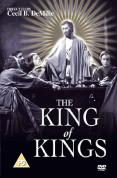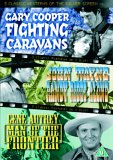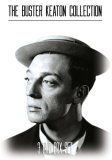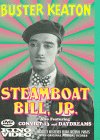![Buster Keaton - College / Steamboat Bill Jr. / Three Ages [1927]](/pictures/1036803.jpg) Buster Keaton - College / Steamboat Bill Jr. / Three Ages | DVD | (13/02/2006)
from £14.99
| Saving you £15.00 (100.07%)
| RRP
Buster Keaton - College / Steamboat Bill Jr. / Three Ages | DVD | (13/02/2006)
from £14.99
| Saving you £15.00 (100.07%)
| RRP College: Coming hard on the heels of Keaton's comic masterpiece 'The General' this was a relaxing romp in both setting and approach after the exacting precision of the American Civil War comic-drama. (Dir. James W. Horne 1927) Steamboat Bill Jr.: Steamboat Bill is William Canfield (Ernest Torrence) the larger-than-life owner of the stern-wheeler 'Stonewall Jackson' which he has operated for many years with his first (and only) mate played by Tom Lewis. Almost the e
 King of Kings | DVD | (10/04/2006)
from £N/A
| Saving you £N/A (N/A%)
| RRP
King of Kings | DVD | (10/04/2006)
from £N/A
| Saving you £N/A (N/A%)
| RRP The King Of Kings is the Greatest Story Ever Told as only Cecil B. DeMille could tell it. In 1927 working with the biggest budget in the history of Hollywood DeMille spun the life and Passion of Christ into one of the highest-grossing films of all time. Featuring text drawn directly from the Bible a cast of thousands and a cinematic bag of tricks that could belong to none other than Hollywood's greatest showman The King Of Kings is at once spectacular and deeply reverent-part Gospel part Technicolor epic.
![The Hunchback of Notre Dame (Silent) [1923]](/pictures/1012829.jpg) The Hunchback of Notre Dame (Silent) | DVD | (16/11/2009)
from £19.89
| Saving you £-9.90 (N/A%)
| RRP
The Hunchback of Notre Dame (Silent) | DVD | (16/11/2009)
from £19.89
| Saving you £-9.90 (N/A%)
| RRP Lon Chaney, the man of a thousand faces, was best known for playing Quasimodo and the Phantom of the Opera. But the former role in The Hunchback of Notre Dame was clearly the most ambitious of his illustrious career, full of such longing and anguish. It's as though his entire being was consumed by this ugly outcast with a heart as big and beautiful as Notre Dame itself. And the makeup is still astonishing. The rest of this unrequited love story is pretty effective as well, with the re-creation of medieval Paris a standout for its lavishness. Like all great silent films, it delivers a poetry of life that is abstract and tangible at the same time. --Bill Desowitz
![Fighting Caravans [1931]](/pictures/1003832.jpg) Fighting Caravans | DVD | (01/08/2001)
from £10.73
| Saving you £-6.74 (N/A%)
| RRP
Fighting Caravans | DVD | (01/08/2001)
from £10.73
| Saving you £-6.74 (N/A%)
| RRP One of the first big-budget Westerns based on a Zane Grey novel. Cooper convinces a fellow traveller on a west-bound caravan to pose as his wife to help disguise him then saves the caravan from an Indian attack. And falls in love of course.
![Steamboat Bill Jr [1928]](/pictures/1012161.jpg) Steamboat Bill Jr | DVD | (10/11/2003)
from £6.19
| Saving you £-1.20 (N/A%)
| RRP
Steamboat Bill Jr | DVD | (10/11/2003)
from £6.19
| Saving you £-1.20 (N/A%)
| RRP Steamboat Bill Jr dates from 1928 and is the last great film Buster Keaton made before he gave up his independence and signed for MGM. Buster is the rather fey son of an elderly steamboat owner who is being driven out of business by a wealthy competitor. More by accident than intention Buster turns things around and gets the girl as well. The last 15 minutes are truly astonishing: a storm sequence in which a whole town is blown apart, with Buster experiencing a series of amazing escapes as buildings fall down around his ears. On the DVD: The print is a good one, best seen in the 4:3 ration, with unobtrusive organ music added. As a nautical extra there's The Boat, a 1921 short (the print not in such a good state as the feature), in which in the course of launching his newly built craft Buster manages to wreck his house, tip his car into the river and sink the boat. And that's only the beginning. --Ed Buscombe
![Buster Keaton [DVD]](/pictures/1143293.jpg) Buster Keaton | DVD | (01/05/2017)
from £N/A
| Saving you £N/A (N/A%)
| RRP
Buster Keaton | DVD | (01/05/2017)
from £N/A
| Saving you £N/A (N/A%)
| RRP Buster Keaton at his very best, with his trademark stoic, deadpan expressions that earned him the nickname The Great Stone Face . The General. Consistently ranked among the greatest films ever made. THE GENERAL is so brilliantly conceived and executed that it continues to inspire awe and laughter with every viewing. Rejected by the Confederate army as unfit, and taken for a coward by his beloved Annabelle Lee (Marion Mack), young Johnny Gray (Keaton) is given a chance to redeem himself when Yankee spies steal his cherished locomotive. Johnny wages a one-man war against hijackers, an errant cannon and the unpredictable hand of fate while roaring along the iron rails. Steamboat Bill Jr. The last of the independent features made in the prime of Buster Keaton s career. STEAMBOAT BILL, JR. is a large-scale follow-up to The General. Keaton stars as William Canfield, Jr., a Boston collegian who returns to his deep-southern roots to reunite with his father, a crusty riverboat captain (Ernest Torrence) who is engaged in a bitter rivalry with a riverboat king coincidentally, the father of Willies sweetheart (Marion Byron). Keaton s athleticism and gift for inventive visual humor are in top form, and the cyclone that devastates a town (and sends houses literally crashing down around him) is perhaps the most ambitious, awe-inspiring and hilarious slapstick sequence ever created. THE NAVIGATOR. In a return to the pampered youth role he had played in The Saphead (and would return to in Battling Butler), Keaton stars as Rollo Treadway, an inexperienced lad of extraordinary wealth and surprisingly little common sense, who finds himself adrift on The Navigator with no one else on board except an equally naive girl (Kathryn McGuire). After discovering each other s presence in an ingenious ballet of unintentional hide-and-seek, the couple resourcefully fashion a home for themselves aboard the derelict boat, in spite of their unfamiliarity with the tools of domesticity. They then embark on a series of misadventures on the ocean floor (where Rollo in a diving suit must parry the attacks of an aggressive swordfish) and upon the high seas, surrounded by a fleet of menacing cannibals, where the film reaches its explosively funny climax, with the aid of a crate of rocket flares.
 3 Classic Westerns Of The Silver Screen - Vol. 1 - Fighting Caravans / Randy Rides Alone | DVD | (06/12/2004)
from £4.99
| Saving you £N/A (N/A%)
| RRP
3 Classic Westerns Of The Silver Screen - Vol. 1 - Fighting Caravans / Randy Rides Alone | DVD | (06/12/2004)
from £4.99
| Saving you £N/A (N/A%)
| RRP Fighting Caravans: One of the first big-budget Westerns based on a Zane Grey novel. Cooper convinces a fellow traveller on a west-bound caravan to pose as his wife to help disguise him then saves the caravan from an Indian attack. And falls in love of course. Randy Rides Alone: The territory has been invaded by a gang of renegades threatening the town and its people. Wyne shows up takes control and single-handedly rides them out of town. Man Of The Frontier:
![Chiller Theatre Features [1923]](/pictures/1012617.jpg) Chiller Theatre Features | DVD | (03/02/2003)
from £N/A
| Saving you £N/A (N/A%)
| RRP
Chiller Theatre Features | DVD | (03/02/2003)
from £N/A
| Saving you £N/A (N/A%)
| RRP It's difficult sometimes to fathom how compilers think. This Chiller Theatre threesome consists of two classic silent horror films, plus a low-budget B-movie from the early 1960s. The connection? You decide! Yet these are films that belong in any self-respecting collection, and this package is a good way of acquiring them. Of those featuring Lon Chaney, it's the original 1923 The Hunchback of Notre Dame that comes across best. Chaney's grotesquerie is shot-through with pathos, and Patsy Ruth Miller's Esmeralda has enduring freshness. Wallace Worsley handles crowd scenes and cathedral stunts with aplomb, and there's an atmospheric "posthumous" soundtrack, though anyone looking for accuracy in the depiction of medieval French society is in for a shock. 1925's The Phantom of the Opera is slow-moving and uneventful by comparison, with Rupert Julian's direction never escaping the narrow Gothic trappings of the novel. Chaney cranks (or is that camps?) up his range of gestures to the limit, and Mary Philbin is an eye-catching heroine, but the denouement in the Paris sewers seems endless--with looped extracts of Schubert and Brahms as a hardly appropriate soundtrack. Cut to 1962, and The Carnival of Souls--made in Kansas for under $100,000--is an undeniable cult classic. Herk Harvey sustains the increasingly surreal narrative with ease, Candace Hilligoss is striking (if a tad gauche) as the young organist caught on the cusp of this world and the next, and Gene Moore's organ soundtrack is a masterly backdrop for the motley assemblage of ghouls who pursue her around the seaside pier in a memorable closing sequence. On the DVD: Chiller Theatre is very acceptably remastered--with 1.33:1 aspect ratio and 12 chapter headings per film--and decently if minimally packaged. --Richard Whitehouse
 Buster Keaton Collection | DVD | (14/04/2008)
from £N/A
| Saving you £N/A (N/A%)
| RRP
Buster Keaton Collection | DVD | (14/04/2008)
from £N/A
| Saving you £N/A (N/A%)
| RRP The Buster Keaton Collection (3 Discs)
 Buster Keaton - Vol. 2 | DVD | (26/03/2001)
from £N/A
| Saving you £N/A (N/A%)
| RRP
Buster Keaton - Vol. 2 | DVD | (26/03/2001)
from £N/A
| Saving you £N/A (N/A%)
| RRP Steamboat Bill Jnr. / 1928: A spoiled young man is forced by his father to learn the ropes of river-boating on the Mississippi. After a series of mishaps which land the captain in jail Buster tries unsuccessfully to spring him. The highlight comes in the shape of a hurricane which smashes and destroys buildings and the pier and allows Buster to prove his worth by saving the Captain who is up to his neck in water. Convict 13 / 1920: Golf is the game that brings out the best in
![The Buster Keaton Collection [1926]](/pictures/1013004.jpg) The Buster Keaton Collection | DVD | (08/10/2001)
from £N/A
| Saving you £N/A (N/A%)
| RRP
The Buster Keaton Collection | DVD | (08/10/2001)
from £N/A
| Saving you £N/A (N/A%)
| RRP Buster Keaton's 1926 masterpiece The General shows the great stone-faced comedian at the height of his powers. Buster is a train driver from the South who's caught up in the American Civil War. The film is basically an extended chase, with trains pursuing each other up the track. The level of stuntwork (including a huge train wreck) has to be seen to be believed, but it's the deftness and elegance of Keaton's comedy that is ultimately most memorable. For many, Buster Keaton is the greatest comedian of the silent era rated even above Chaplin, and College (1927) is one of his finest films. A poor student who has to work his way through college, Buster is desperate to win the attention of a pretty girl so takes up sports. Through every disaster, the great "stone face" as he was nicknamed betrays not a flicker of emotion, enduring all humiliations with aplomb. College shows Keaton at the top of his form. Steamboat Bill Jr dates from 1928 and is the last great film Buster Keaton made before he gave up his independence. Buster is the rather fey son of an elderly steamboat owner who is being driven out of business by a wealthy competitor. More by accident than intention Buster turns things around and gets the girl as well. The last 15 minutes are truly astonishing: a storm sequence in which a whole town is blown apart, with Buster experiencing a series of amazing escapes as buildings fall down around his ears. Tragically, the following year he lost his independence when he signed for MGM. His career collapsed, his marriage broke up and he became an alcoholic, never to regain former glories. On the DVD: The organ music accompanying this silent feature is pleasantly unobtrusive, and apart from a short section in the middle where it deteriorates, the print quality is a reasonable 4.3. In addition there are five excellent Keaton shorts, One Week (1920), The Boat (1921) Cops (1922), The Blacksmith (1922) and The Balloonatic (1923). --Ed Buscombe
![Steamboat Bill Jr [1928]](/pictures/1013105.jpg) Steamboat Bill Jr | DVD | (18/06/2001)
from £N/A
| Saving you £N/A (N/A%)
| RRP
Steamboat Bill Jr | DVD | (18/06/2001)
from £N/A
| Saving you £N/A (N/A%)
| RRP Steamboat Bill Jr dates from 1928 and is the last great film Buster Keaton made before he gave up his independence and signed for MGM. Buster is the rather fey son of an elderly steamboat owner who is being driven out of business by a wealthy competitor. More by accident than intention Buster turns things around and gets the girl as well. The last 15 minutes are truly astonishing: a storm sequence in which a whole town is blown apart, with Buster experiencing a series of amazing escapes as buildings fall down around his ears. On the DVD: The print is a good one, best seen in the 4:3 ration, with unobtrusive organ music added. As a nautical extra there's The Boat, a 1921 short (the print not in such a good state as the feature), in which in the course of launching his newly built craft Buster manages to wreck his house, tip his car into the river and sink the boat. And that's only the beginning. --Ed Buscombe
![Comedy Greats [1914]](/pictures/1012621.jpg) Comedy Greats | DVD | (03/02/2003)
from £N/A
| Saving you £N/A (N/A%)
| RRP
Comedy Greats | DVD | (03/02/2003)
from £N/A
| Saving you £N/A (N/A%)
| RRP A "two-plus-one" package from Siren, Comedy Greats features classics from the two greatest silent-screen comics, Charlie Chaplin and Buster Keaton, plus a rather dreary effort from Danny Kaye. Never the most scintillating of comedians, Kaye's personable talents are thinly spread in 1949's The Inspector General. Distantly(!) based on a short story by Russian satirist Nikolay Gogol, this tale of mistaken identity enables Kaye to indulge in obvious wisecracks and not-so-smart dialogue. Sylvia Fine's songs are mildly amusing, and Henry Koster draws capable support from Walter Slezak and Elsa Lanchester, but it's a long haul. When he made Tilli's Punctured Romance in 1914, Charles Chaplin had yet to perfect the "little man" routine which made him the most popular 1920s screen star. His loveable rogue is well displayed opposite Marie Dressler's formidable country maid, whose unexpected windfall becomes the real object of his desire. Mabel Normand contributes an attractively period chic, and if, in the hands of Mack Sennett, the humour tends to fall back on music-hall slapstick, the historical significance of the film is undoubted. Yet it's Buster Keaton's 1928 classic Steamboat Bill Jr which comes out on top here. Keaton is perfectly cast as the put upon student, whose bravery saves both his father and his steamboat-owning rival, and wins the hand of the latter's daughter. Solid support comes from Ernest Torrence and the winsome Marion Byron, with Charles Riesner getting maximum drama from the cyclone sequence, but it's Keaton's soulful expression and breathtaking stuntwork which are the most potent reminders of a talent only later to receive its due. On the DVD: Comedy Greats is acceptably remastered, with 1.33:1 aspect ratio and 12 chapter headings per film, and decently packaged, this is worth acquiring--even though Keaton's film is the only one you're likely return to often. --Richard Whitehouse
![Buster Keaton-Steamboat Bill Jr. [DVD]](/pictures/1096807.jpg) Buster Keaton-Steamboat Bill Jr. | DVD | (26/10/2009)
from £12.13
| Saving you £-2.14 (N/A%)
| RRP
Buster Keaton-Steamboat Bill Jr. | DVD | (26/10/2009)
from £12.13
| Saving you £-2.14 (N/A%)
| RRP Steamboat Bill is excited that his son (Steamboat Bill Jr.) is coming to visit him. When he does he tries to turn him into a proper person for working on the boats while his son resists. Meanwhile Kitty a girl that he knows from school in Boston spots him and introduces him to her father a rival of Steamboat Bill. He tries to be alone with her but gets caught several times and is given a ticket back to Boston. Steamboat Bill gets arrested for unruly conduct (on a condemnation notice of his boat) and it's up to Bill Jr. to rescue his dad - in the middle of a cyclone storm.
![Fighting Caravans [1931]](/pictures/1002874.jpg) Fighting Caravans | DVD | (20/01/2003)
from £21.02
| Saving you £-4.03 (-23.70%)
| RRP
Fighting Caravans | DVD | (20/01/2003)
from £21.02
| Saving you £-4.03 (-23.70%)
| RRP Gary Cooper stars in this adaptation of Zane Grey's western as a young frontiersman who journeys across the country with his freight wagon. On the way he fights Indians and evil traders while his old companions try to keep him from falling in love!
![Fighting Caravans [1931]](/pictures/1082641.jpg) Fighting Caravans | DVD | (19/05/2008)
from £6.49
| Saving you £-1.50 (N/A%)
| RRP
Fighting Caravans | DVD | (19/05/2008)
from £6.49
| Saving you £-1.50 (N/A%)
| RRP This action-packed western set in the civil war follows the struggle of a caravan of freight wagons making its way west. Being led by a young frontier scout who helps fight against Indians and evil traders helps it along its way but when he meets and falls for a french maiden his two crusty companions try to get in the way of their romance.
![Fighting Caravans [DVD] [1931]](/pictures/1097619.jpg) Fighting Caravans | DVD | (30/11/2009)
from £10.78
| Saving you £-2.79 (-34.90%)
| RRP
Fighting Caravans | DVD | (30/11/2009)
from £10.78
| Saving you £-2.79 (-34.90%)
| RRP This action-packed western set in the civil war follows the struggle of a caravan of freight wagons making its way west. Being led by a young frontier scout who helps fight against Indians and evil traders helps it along its way but when he meets and falls for a french maiden his two crusty companions try to get in the way of their romance. A young frontier scout helps guide a freight wagon train across the country fighting off Indians and evil traders while his two crusty companions try and save him from falling in love. Timeless classic western movie.
 Steamboat Bill, Jr. | DVD | (26/10/1999)
from £N/A
| Saving you £N/A (N/A%)
| RRP
Steamboat Bill, Jr. | DVD | (26/10/1999)
from £N/A
| Saving you £N/A (N/A%)
| RRP Steamboat Bill Jr dates from 1928 and is the last great film Buster Keaton made before he gave up his independence and signed for MGM. Buster is the rather fey son of an elderly steamboat owner who is being driven out of business by a wealthy competitor. More by accident than intention Buster turns things around and gets the girl as well. The last 15 minutes are truly astonishing: a storm sequence in which a whole town is blown apart, with Buster experiencing a series of amazing escapes as buildings fall down around his ears. On the DVD: The print is a good one, best seen in the 4:3 ration, with unobtrusive organ music added. As a nautical extra there's The Boat, a 1921 short (the print not in such a good state as the feature), in which in the course of launching his newly built craft Buster manages to wreck his house, tip his car into the river and sink the boat. And that's only the beginning. --Ed Buscombe

Please wait. Loading...
This site uses cookies.
More details in our privacy policy